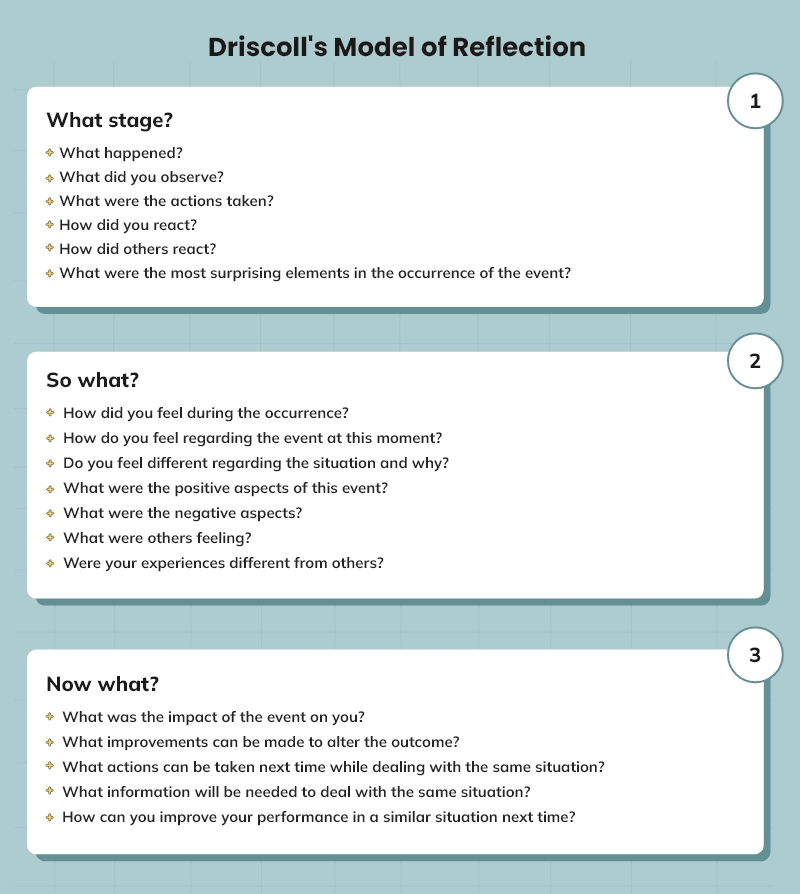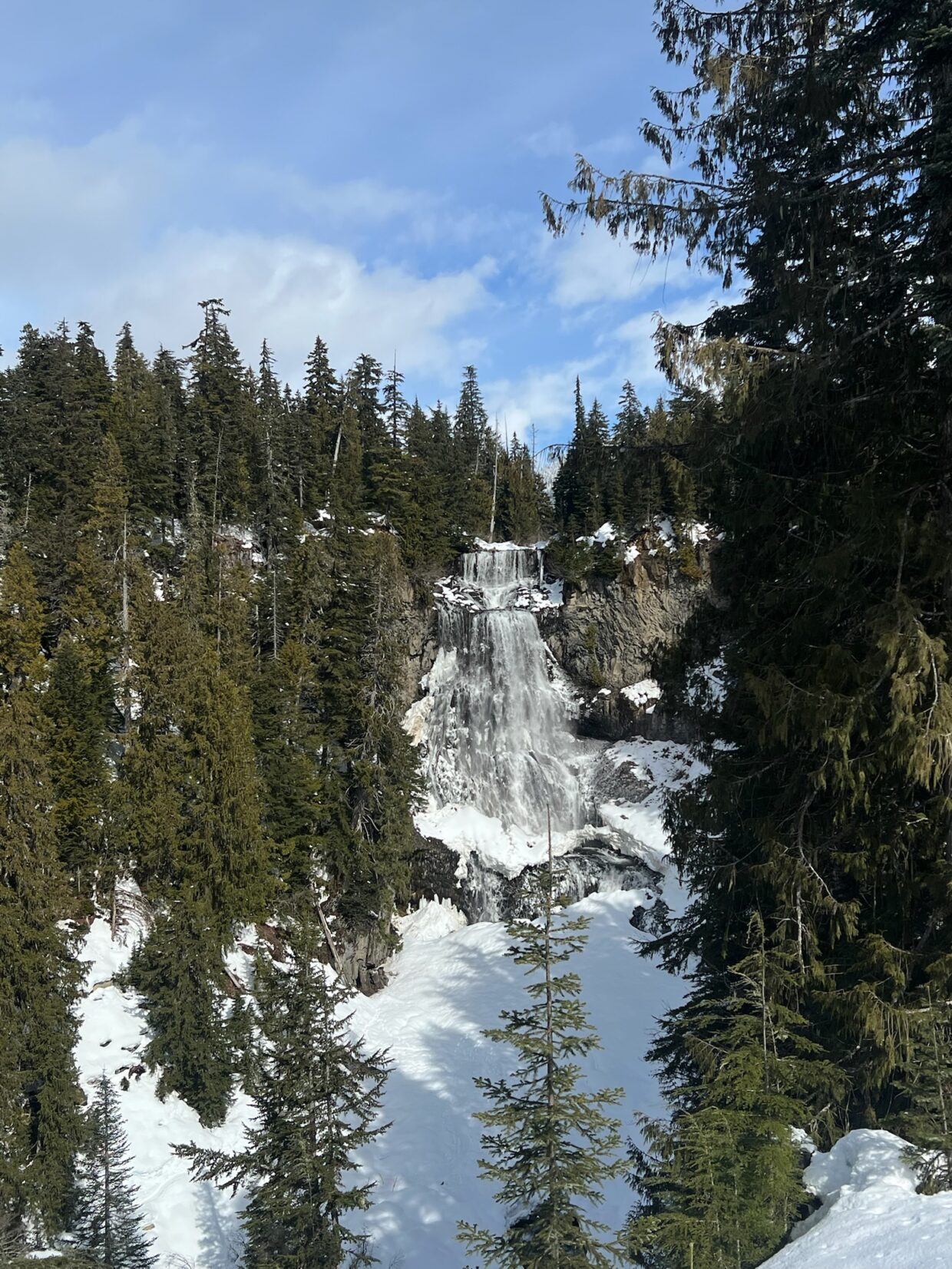
I have decided to reflect using this model because I feel it allows me to explore my thoughts in as much depth as I’d like. I also appreciate that each section includes many guiding questions, making the reflection process more structured and meaningful. I find that I am able to reflect more easily with this model, whereas with the Gibbs Reflective Cycle, some questions feel too broad or do not encourage reflection on different aspects of the situation. I enjoy using Driscoll’s Reflective Cycle because it allows me to consider multiple viewpoints, which I find highly beneficial.

My reflection topic: Science Demonstration Day
1. What stage?
- What happened? I came to class ready to present my fun and engaging science project on chemical reactions, using the scientific method to reflect on the experiment. My presentation focused on elephant toothpaste.
- What did you observe? I observed my classmates taking on their roles as my students. They were highly engaged and asked insightful, critical questions regarding the procedure, safety, and materials.
- What were the actions taken? I pre-mixed a concoction of yeast and warm water before presenting. With the students, we first mixed hydrogen peroxide with a bit of dish soap. The students stood back behind the safety zone as I poured the hydrogen peroxide into the yeast mixture. The elephant toothpaste exploded, and students were encouraged to come and feel the heat of the chemical reaction when it was safe to do so.
- How did you react? I was very excited that the presentation went as planned and that my experiment worked. I was grateful that I followed my own instructions and explained the experiment to the best of my ability at the time. While I sometimes struggle with presenting in front of my peers, I felt very confident during this presentation.
- How did other react? The students seemed engaged, and I know that a fun, colorful experiment is usually quite captivating for younger audiences. They were intrigued by the colors of the elephant toothpaste at the end and were very satisfied with the bubbles it produced. They also enjoyed the texture and the feeling of the experiment.
- What were the most surprising elements in the occurrence of the event? I thought the experiment might explode a bit more than it did, as the first time I created it, it erupted quite dramatically. I ended up being a little overly cautious this time.
2. So what?
- How did you feel during the occurrence? I felt excited, hoping that my students would feel as excited as I was while presenting this fun science experiment.
- How did you feel regarding the event at this moment? I felt that the explosion could have been more dramatic, like the first time I tried it. However, I was happy not to have created a mess in the school, especially since it had just been cleaned.
- Do you feel different regarding this situation and why? I’m still quite happy with the presentation. However, some of the instructions were unclear at first. We should talk to our students as if they are students, but also provide hints, considering they are all teachers as well. I felt that if this had been explained earlier, it might have improved my mark, but it’s no big deal.
- What were the positive aspects of this event? I was glad that my class was engaged and excited to watch the science experiment, as well as reflect on their findings.
- What were the negative aspects? I was not informed prior to my presentation that there was an expectation not to refer to my teacher peers as teachers and students.
- What were others feeling? I received many compliments on my presentation, so I believe my classmates were having a good time. During their presentations, I noticed that others felt similarly that they wished they had known not to reference their peers as teachers, but only as students when teaching.
- What were your experiences from others? They all had very engaging presentations, and I loved getting ideas for what I could possibly teach in my own future classroom.
3. Now what?
- What were the impacts of the event on you? I learned the importance of understanding each teacher’s individualized expectations prior to a presentation. I also discovered some cool and inspiring science experiments that I could bring into my own classroom.
- What improvements can be made to alter the outcome? If I were to redo this presentation, I would make sure not to use overly descriptive words and ensure that I don’t reference students as teachers during the presentation.
- What actions can be taken next time while dealing with the same situation? I would ask more in-depth questions about each assignment to fully understand what is expected in the presentation, ensuring that I don’t lose points due to not being aware of certain requirements beforehand.
- What information will be needed to deal with the same situation? I would seek a more in-depth understanding of the assignment or request a written explanation of any additional expectations not covered in the rubric.
- How can you improve your performance in a similar situation next time? I would run through the presentation a couple more times to feel more confident overall when teaching it to my classmates. I would also take a few minutes beforehand to breathe and prepare myself.
This video reflects on understanding the importance of reflective thinking, however, it does not involve Driscoll but many other reflective cycles.
What teaching competencies did I feel connected to this topic the most:
Uvic 4- Demonstrate an understanding of the complexity of teaching and learning.
BC Teaching Standard 6– Educators demonstrate a broad knowledge base and an understanding of areas they teach.
I feel that these standards align closely with my presentation and how I reflected on it. Through these presentations, I specifically learned about the broad range of knowledge that teachers acquire over years of teaching different grades. There is such a vast amount of content whether in science or any other subject within the curriculum that teachers master over time, which is incredibly impressive. Teaching is complex and can be overwhelming at times, but it’s true that teachers learn and grow with their students, especially as new teachers.
